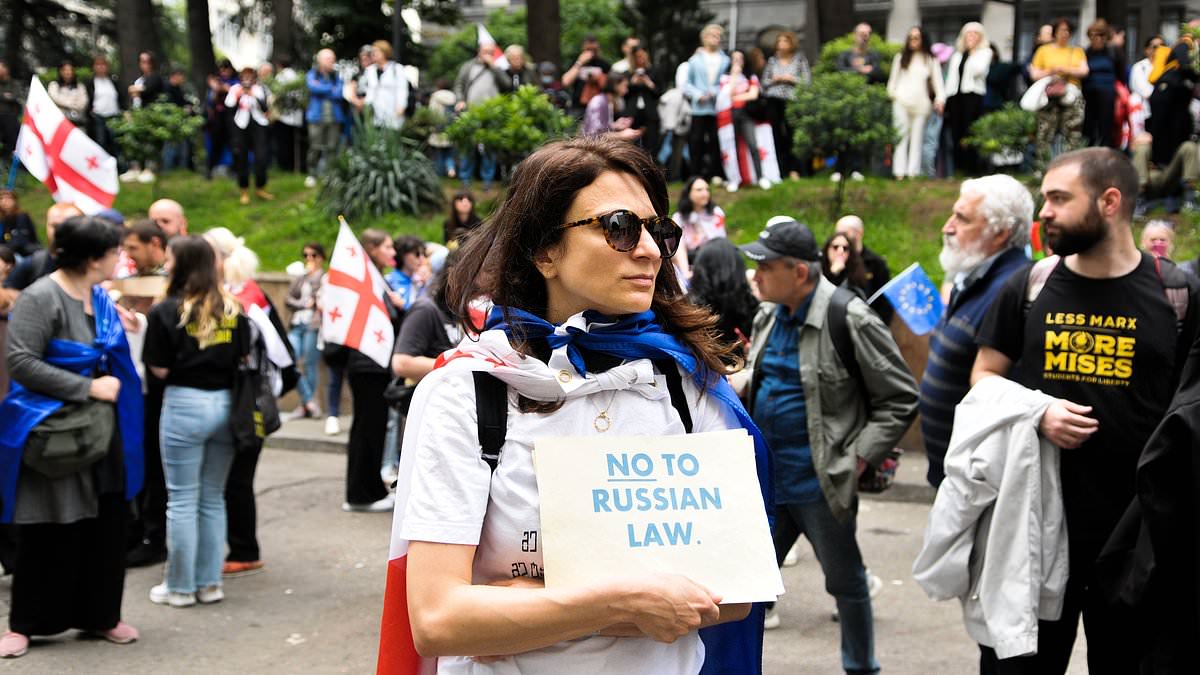The Georgian parliament on Tuesday overrode a presidential veto of the ‘foreign agents’ legislation that has fueled Western concerns and sparked massive protests for weeks against the law described as ‘the Russian law’.
The legislature, controlled by the ruling Georgian Dream party, dismissed President Salome Zourabichvili’s veto of the legislation that she and other critics say will restrict media freedom and obstruct Georgia’s chances of joining the European Union.
The president now has five days to endorse the bill. If she doesn’t do so, the parliament speaker will sign it into law.
The bill that was approved by the parliament earlier this month would require media outlets and nongovernmental organisations that receive more than 20 per cent of their funding from abroad to register as ‘pursuing the interests of a foreign power’.
Zourabichvili, who is increasingly at odds with the governing party, vetoed the bill on May 18.
She has accused the governing party of jeopardizing the country’s future and ‘hindering the path toward becoming a full member of the free and democratic world.’
Lawmakers voted 84 to four to overrise a veto by Zourabichvili and pass the bill in a contentious parliament session – but most opposition MPs walked out of the chamber ahead of the vote.
A Georgian Dream deputy also doused the leader of an opposition party with water while he spoke from the rostrum.
The government says the bill is needed to stem what it deems to be harmful foreign actors trying to destabilize the South Caucasus nation of 3.7 million, but many Georgian journalists and activists argue that the bill’s true goal is to stigmatize them and restrict debate ahead of parliamentary elections scheduled for October.
Opponents denounce the legislation as ‘the Russian law’ because it resembles measures pushed through by the Kremlin to crack down on independent news media, nonprofits and activists.
Critics say the measure may have been driven by Moscow to thwart Georgia’s chances of further integrating with the West.
The bill has been widely criticised by the European Union, United Nations, NATO, and the US with Washington having announced travel sanctions over the measure.
Last week, US Secretary of State Antony Blinken announced that the travel sanctions would be imposed on Georgian officials ‘who are responsible for or complicit in undermining democracy in Georgia.’
He noted that ‘it remains our hope that Georgia’s leaders will reconsider the draft law and take steps to move forward with their nation’s democratic and Euro-Atlantic aspirations.’
The bill is nearly identical to one that the ruling party was pressured to withdraw last year after massive street protests.
Renewed demonstrations again gripped Georgia as the bill made its way through parliament, with demonstrators seen scuffling with police, who used tear gas and water cannons to disperse them.
Earlier this month, violence broke out both inside and outside parliament as footage captured the moment demonstrators attempted to break through the barriers outside the government building as hundreds of police officers stormed out and roughly dragged people wrapped in Georgian flags away from the barriers.
A violent brawl also erupted inside the parliament building while lawmakers debated the bill before approving it on May 14.
But it wasn’t just demonstrators wrapped up in the chaos as MPs also became embroiled in the drama.
In one piece of footage, Georgian Dream MP Dimitry Samkharadze was seen charging toward Levan Khabeishvili, the chairman of main opposition party United National Movement, after Khabeishvili accused him of organising mobs to beat up opposition supporters.
The European Union’s foreign policy arm has said that adoption of the law ‘negatively impacts Georgia’s progress on the EU path.’
The EU offered Georgia candidate status last December, while making it clear that Tbilisi needs to implement key policy recommendations for its membership bid to progress.
The opposition United National Movement has described the bill as part of efforts by Georgian Dream to drag the country into Russia’s sphere of influence – claims it vehemently denies.
Georgian Dream was founded by Bidzina Ivanishvili, a former prime minister and billionaire who made his fortune in Russia.
Zuka Elbakidze, a student who was among protesters rallying in Tbilisi ahead of Tuesday’s vote, said ‘this day will determine the fate of our country,’ adding that ‘we are making a choice between Europe and Russia, and all the people gathered here, except the policemen, want Europe and the West.’
‘We are physically witnessing, literally witnessing, how Georgian citizens, how members of the Georgian Parliament are selling out our country,’ said another protester, Mariam Geguchadze.
Russia-Georgia relations have often been rocky since Georgia became independent after the 1991 collapse of the Soviet Union.
In 2008, Russia fought a brief war with Georgia, which had made a botched attempt to regain control over the breakaway province of South Ossetia.
Moscow then recognized South Ossetia and another separatist province, Abkhazia, as independent states and strengthened its military presence there.
Most of the world considers both regions to be parts of Georgia.
Tbilisi cut diplomatic ties with Moscow, and the regions’ status remains a key irritant even as Russia-Georgia relations have improved in recent years.
